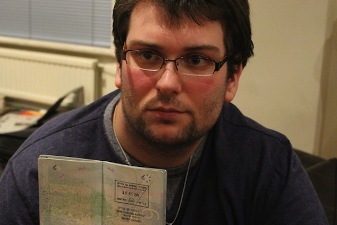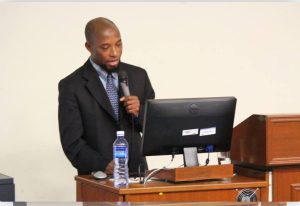
peace
activist Gary Spedding holds up his passport, with a refusal stamp from the Israeli border authorities. (photo: Aaron Dover)" width="300" height="200" /> British peace activist Gary Spedding holds up his passport, with a refusal stamp from the Israeli border authorities. (photo: Aaron Dover)Betlehem, 12 Dhulqo’dah 1436/27 August 2015 (MINA) – Israel’s Interior Ministry banned British peace activist Gary Spedding from the country for 10 years, claiming that he was an anti-Semitic liar who might start a riot. Unlike other activists who have suffered the same fate, Spedding isn’t giving up without a fight.
An Israeli court is slated to rule next month on a case involving a British human rights activist who was denied entry into the country, deported, and banned for 10 years, who claims that the Interior Ministry is targeting him for his political views.
It all began on January 9, 2014. Gary Spedding, a 25-year-old British pacifist and human rights activist, arrived at Ben-Gurion Airport for a short visit of a little over a week in Tel Aviv and Bethlehem in order to meet with local activists (myself included) and political leaders. 972mag.com quoted by Mi’raj Islamic News Agency (MINA). Wednesday.
It was supposed to be Spedding’s fifth visit to Israel/Palestine in four years, with the previous four going off without a hitch.
Also Read: Israeli Forces Continue Demolitions and Strikes in Gaza Despite Ceasefire
The visits were intended to allow Spedding, who is committed to peace between Israelis and Palestinians, to continue learning about the issue from up close, and talk to people about the relative success of the Northern Ireland peace agreement.
Despite his young age, Spedding is a one of the central activists in the Alliance Party of Northern Ireland the only joint Protestant-Catholic party in Northern Ireland’s parliament.
But upon stepping up to the passport control at Ben-Gurion Airport, Spedding was taken to a small room where he said the security team logged onto his mobile phone without permission and scanned through his contacts, text messages and email, manually copying some of the content onto a notepad.
He also underwent a lengthy full-body check, and was eventually jailed before being deported. I was told by the Administration of Border Crossings, Population and Immigration that Spedding had been banned for 10 years because of his activities on social media, fearing that he could start riots in Israel or the occupied territories if allowed into the country.
Also Read: Hamas Returns Remains of Another Israeli Hostage Under Gaza Ceasefire Deal
Countless activists have undergone the same procedure, from artists to intellectuals to left-wingers.
Spedding began his legal battle against his deportation while still in detention, and continued to pursue upon his return to Britain. After Attorney Gabi Lasky failed to convince the Interior Ministry to change the decision, Spedding submitted an appeal to the Entry to Israel Law Review Tribunal.
These kinds of bans have become more common over the past few years. Those banned include the likes of Professor Noam Chomsky, the 2012 Flytilla activists, activists from Christian organizations or Palestinian aid groups not to mention foreign nationals of Palestinian descent, who come to visit their families.
This is just a short list, but it is rare that someone takes these cases to court. The court’s ruling could have potential consequences on the Interior Ministry’s policies vis-a-vis other foreign nationals, whose political beliefs are critical of the government. British national challenges Israel’s policy of deporting peace activists
Also Read: Knesset Approves Draft Law Allowing Israelis to Own Property in Occupied West Bank
Israel’s Interior Ministry banned British peace activist Gary Spedding from the country for 10 years, claiming that he was an anti-Semitic liar who might start a riot. Unlike other activists who have suffered the same fate, Spedding isn’t giving up without a fight.
An Israeli court is slated to rule next month on a case involving a British human rights activist who was denied entry into the country, deported, and banned for 10 years, who claims that the Interior Ministry is targeting him for his political views.
It all began on January 9, 2014. Gary Spedding, a 25-year-old British pacifist and human rights activist, arrived at Ben-Gurion Airport for a short visit of a little over a week in Tel Aviv and Bethlehem in order to meet with local activists (myself included) and political leaders.
It was supposed to be Spedding’s fifth visit to Israel/Palestine in four years, with the previous four going off without a hitch.
Also Read: Heavy Rains Flood Tents of Displaced Palestinians in Southern Gaza
The visits were intended to allow Spedding, who is committed to peace between Israelis and Palestinians, to continue learning about the issue from up close, and talk to people about the relative success of the Northern Ireland peace agreement.
Despite his young age, Spedding is a one of the central activists in the Alliance Party of Northern Ireland the only joint Protestant-Catholic party in Northern Ireland’s parliament.
But upon stepping up to the passport control at Ben-Gurion Airport, Spedding was taken to a small room where he said the security team logged onto his mobile phone without permission and scanned through his contacts, text messages and email, manually copying some of the content onto a notepad.
He also underwent a lengthy full-body check, and was eventually jailed before being deported. I was told by the Administration of Border Crossings, Population and Immigration that Spedding had been banned for 10 years because of his activities on social media, fearing that he could start riots in Israel or the occupied territories if allowed into the country.
Also Read: Death Toll in Gaza Reaches 69,775, Majority Women and Children
Countless activists have undergone the same procedure, from artists to intellectuals to left-wingers.
Spedding began his legal battle against his deportation while still in detention, and continued to pursue upon his return to Britain. After Attorney Gabi Lasky failed to convince the Interior Ministry to change the decision, Spedding submitted an appeal to the Entry to Israel Law Review Tribunal.
These kinds of bans have become more common over the past few years. Those banned include the likes of Professor Noam Chomsky, the 2012 Flytilla activists, activists from Christian organizations or Palestinian aid groups not to mention foreign nationals of Palestinian descent, who come to visit their families.
This is just a short list, but it is rare that someone takes these cases to court. The court’s ruling could have potential consequences on the Interior Ministry’s policies vis-a-vis other foreign nationals, whose political beliefs are critical of the government. (T/P002/R03)
Also Read: Israel Urges Indian Jews to “Return” to Zionist-Occupied Territories in Palestine
Mi’raj Islamic News Agency (MINA)
Also Read: UNRWA: 90% of Gaza’s Population Depends on Humanitarian Aid Amid Israeli Restrictions



































 Mina Indonesia
Mina Indonesia Mina Arabic
Mina Arabic